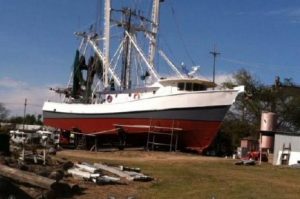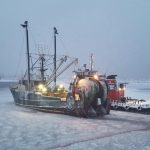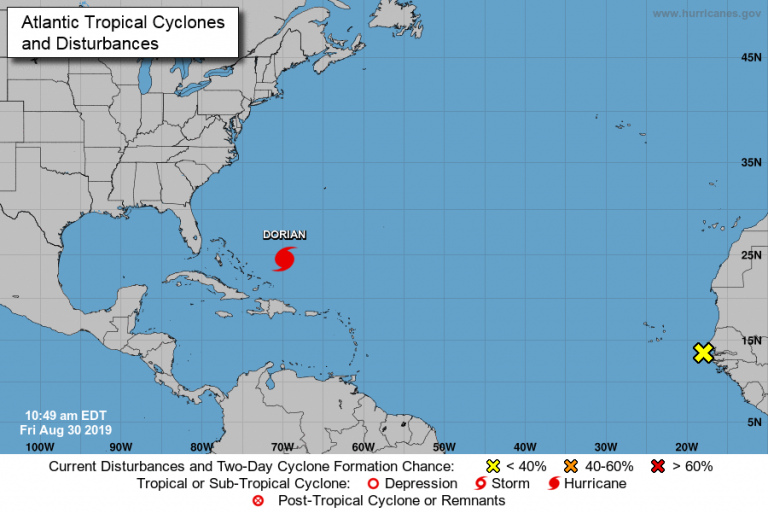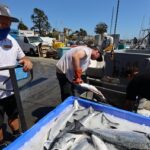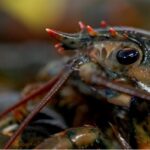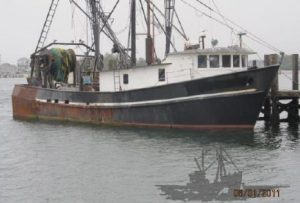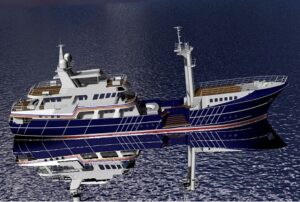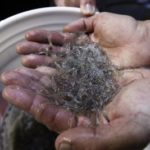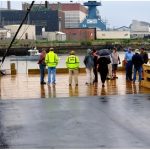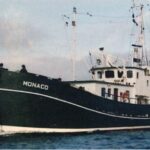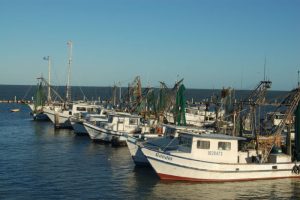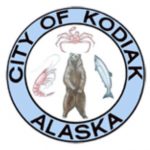Tag Archives: Groundfish Forum
Federal judge to rule on reduction in trawler halibut bycatch
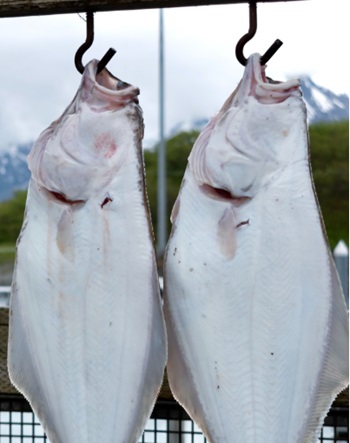 A U.S. District court judge is expected to issue a decision this spring on a lawsuit filed by the Groundfish Forum challenging a National Marine Fisheries Service (NMFS) decision setting abundance-based limits on halibut bycatch in the Amendment 80 Bering Sea trawl fishery. The Groundfish Forum, based in Seattle, filed its complaint with the U.S. District Court in Anchorage on Dec. 19, challenging the new halibut bycatch rules that were first adopted by the North Pacific Fishery Management Council and subsequently approved by NMFS. On Feb. 29, the Halibut Defense Alliance intervened on the side of NMFS over concerns about the number of halibut taken as bycatch by Amendment 80 vessels in the Bering Sea, saying the limits on halibut bycatch would ensure more equitable access to halibut fisheries. The alliance is a broad coalition of commercial harvesters, charter operators, processors and community organizations representing halibut-dependent communities in Alaska and the Pacific Northwest. more, >>click to read<< 19:52
A U.S. District court judge is expected to issue a decision this spring on a lawsuit filed by the Groundfish Forum challenging a National Marine Fisheries Service (NMFS) decision setting abundance-based limits on halibut bycatch in the Amendment 80 Bering Sea trawl fishery. The Groundfish Forum, based in Seattle, filed its complaint with the U.S. District Court in Anchorage on Dec. 19, challenging the new halibut bycatch rules that were first adopted by the North Pacific Fishery Management Council and subsequently approved by NMFS. On Feb. 29, the Halibut Defense Alliance intervened on the side of NMFS over concerns about the number of halibut taken as bycatch by Amendment 80 vessels in the Bering Sea, saying the limits on halibut bycatch would ensure more equitable access to halibut fisheries. The alliance is a broad coalition of commercial harvesters, charter operators, processors and community organizations representing halibut-dependent communities in Alaska and the Pacific Northwest. more, >>click to read<< 19:52
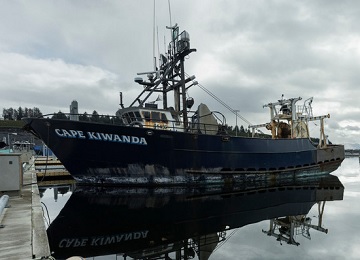
In Depth: Alaska’s Fisheries Are Collapsing. This Congresswoman Is Taking on the Industry She Says Is to Blame.
The late 1990s and early 2000s were boomtimes for halibut fishermen in Alaska. Over 80 million pounds of the flatfish were being harvested annually. Deckhands could earn $250,000 a season. The small boat harbor in the southcentral city of Homer, known as the “halibut capital of the world,” was bustling. Erik Velsko, 39, was one of those fishermen. He started buying annual shares in 2001 when the halibut population was at near historic highs. But within a few years, the stock plummeted by more than half and the quotas for commercial fishermen were slashed accordingly. Halibut wasn’t the only so-called directed fishery to experience such a catastrophic drop. The crab fleet — made famous in the reality show “Deadliest Catch” — has been mostly stuck in port for two years after the near total collapse of the snow crab population and the decades long decline of red king crab. Photos, >click to read< 11:42
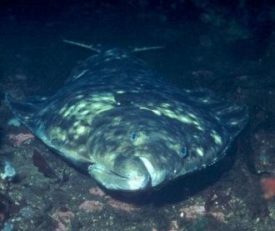
NPFMC ties limits on Bering Sea trawlers to halibut abundance
The council that manages fishing in federal waters voted to link groundfish trawl fishing in the Bering Sea and Aleutian Islands to halibut abundance today. The action caps, at least for now, a six-year debate about curbing halibut bycatch in Alaska. For many who have been following that debate, the decision comes as a surprise, since it’s expected to deal what trawlers say is a crushing blow to their fishery. >click to read< 09:10
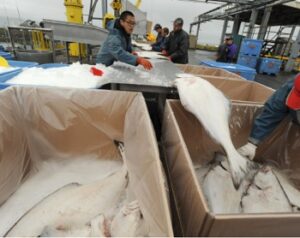
Bering Sea fishermen press NPFMC on halibut bycatch
After years of deliberations, the North Pacific Fishery Management Council is inching toward a decision on whether to tie halibut bycatch limits in the Bering Sea to abundance indices. The action, known formally as Bering Sea-Aleutian Islands halibut abundance-based management, or ABM, is intended to reduce bycatch of halibut in the Bering Sea by the Amendment 80 trawl fleet when the fish stocks are lower. The Amendment 80 fleet is a group of catcher-processor vessels that are allocated a portion of groundfish harvest. Each year, the fleet is bound to a hard limit on how many halibut they can take as bycatch, known as the prohibited species catch, or PSC limit. >click to read< 08:34
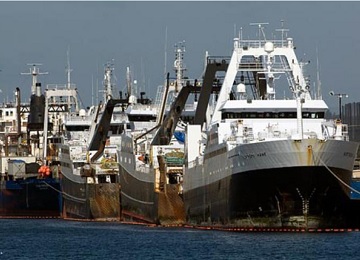
An inside look at Seattle’s fishing industry
This unique network of professionals, ranging from shipbuilders to pipe fitters to marine electricians and more helps fuel the local economy and offers a range of career options. When fishing fleets, based at the Port of Seattle’s Terminal 91 on the Seattle waterfront in Interbay, return laden with their catch, a single ship might carry fillet blocks, loin blocks, surimi, roe, fish meal and fish oil, says Kelli Goodwin, senior manager, Maritime Operations at the Port of Seattle. These products are separated and loaded into export carriers, on-site freezer cold storage, rail cars (for fish oil) or long-haul trucks for domestic distribution. “The next fish stick or fish fillet sandwich you eat, likely was caught by a vessel that calls Seattle home,” >click to read< 14:05
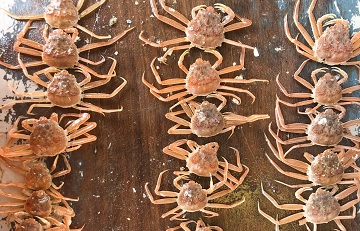
Alaska snow crab harvest slashed by nearly 90% after population crash in a warming Bering Sea
The snow crab is a mainstay of the Alaska crab boat fleet, much of it based in Washington, and the 2021-22 catch limit of 5.6 million pounds, announced Friday, is down 88% from the previous season. The 2021 fall harvest of Bristol Bay red king crab, another important source of revenue for that fleet, was canceled for this year because of too few females. The combined impacts of the closure and snow crab cutbacks are a big financial hit to crabbers who in past years have grossed more than $200 million from the two harvests. At a meeting of the North Pacific Fishery Management Council this week, crabbers called for additional restrictions in other harvests. >click to read< 09:30
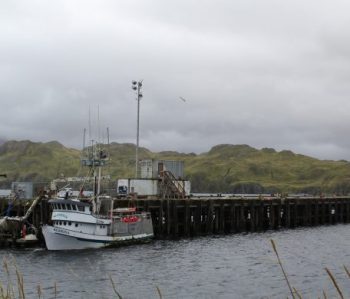
Amid a big fight for cod in the Bering Sea, can remote Adak survive?
A heap of slimy fish heads nearly filled a deep tote. Above, workers finished sorting stacks of decapitated halibut they had run through a grim mechanical apparatus. “Right here we have a guillotine blade,” said Mike Lauer, showing off the de-heading device. “We’ll sell the cheeks, and then we can use the heads for bait,” he added. Lauer is in charge of quality control for Golden Harvest, a processing plant on Adak that’s at the center of a fish war in the Bering Sea pitting two small Aleutian Island communities against large out of state fishing interests. And the implications of that fight could stretch to other coastal fishing towns in Alaska. >click to read< 21:08
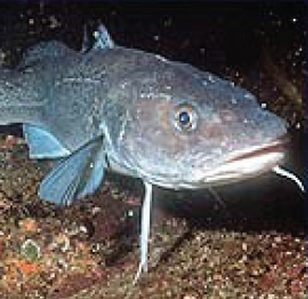
Council turns down petition sought to protect Adak processor
The North Pacific Fishery Management Council decided not to approve an emergency petition from a group of Aleutian Islands stakeholders at its meeting June 9, instead taking a longer route through a discussion to look at the set-aside options for the area. The petition had sought an emergency quota set-aside of Pacific cod, separate from the general Bering Sea-Aleutian Islands quota, to help sustain the shore-based plant and thus the community. >click to read<09:36

Bering Sea cod conflict brewing between on and offshore buyers
“Cod Alley” is getting crowded, and some fishermen want to limit the boats in the narrow congested fishing area in the Bering Sea. The North Pacific Fishery Management Council is looking at changes, including restricting flatfish factory trawlers from buying cod offshore. The Pacific Seafood Processors Association is pushing for restrictions on factory trawlers to protect its members’ shore plants in Unalaska, Akutan, King Cove and Sand Point. According to the PSPA’s Nicole Kimball, seven factory trawlers bought cod from 17 catcher boats in 2017,,, click here to read the story 21:23
Fishing-industry groups blast Inslee over his picks for federal council
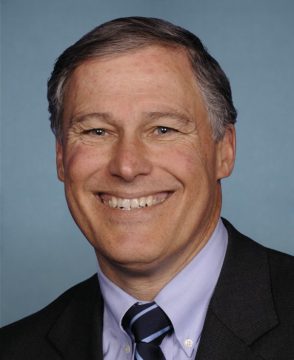 Gov. Jay Inslee’s handling of nominations for a federal fishery-council seat has come under attack from the leaders of major North Pacific fishing-industry groups, which have taken the unusual step of sending a complaint letter to the U.S. Secretary of Commerce.,, In their letter sent Tuesday, they asked Commerce Secretary Wilbur Ross to reject Inslee’s nominations and called for the governor to come up with some new names for a seat on the council. The industry backlash reflects the high stakes in fish politics, where the federal fishery council helps sets the rules for a billion-dollar groundfish harvest, much of which is caught and processed by Seattle-based companies. The letter is signed by the leaders of the Pacific Seafood Processors Association, At-Sea Processors Association, Groundfish Forum, and United Catcher Boats, whose membership collectively catches or processes most the groundfish. Read the article, click here 10:05
Gov. Jay Inslee’s handling of nominations for a federal fishery-council seat has come under attack from the leaders of major North Pacific fishing-industry groups, which have taken the unusual step of sending a complaint letter to the U.S. Secretary of Commerce.,, In their letter sent Tuesday, they asked Commerce Secretary Wilbur Ross to reject Inslee’s nominations and called for the governor to come up with some new names for a seat on the council. The industry backlash reflects the high stakes in fish politics, where the federal fishery council helps sets the rules for a billion-dollar groundfish harvest, much of which is caught and processed by Seattle-based companies. The letter is signed by the leaders of the Pacific Seafood Processors Association, At-Sea Processors Association, Groundfish Forum, and United Catcher Boats, whose membership collectively catches or processes most the groundfish. Read the article, click here 10:05
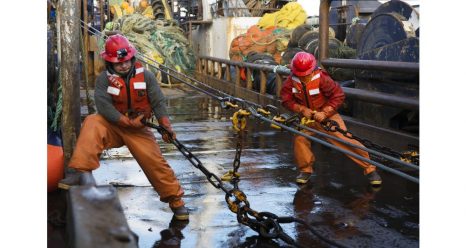
Harvesting flatfish in the Last Frontier
Docked in Seattle a few days after Thanksgiving, the F/T Constellation is still filled with the smell of coastal Alaska waters; briny ocean and fresh fish. It wafts up from the lower levels and covers the deck. The vessel has been scrubbed and scoured, but the aroma is impossible to shake. The 165-foot vessel spent the better part of 2016 trawling the Bering Sea. For months, it carried several dozen crewmembers, decks full of equipment and freezers full of fresh seafood. It motored in and out of Dutch Harbor, the fishing capital of the Aleutian Island chain. While it’ll spend the early winter in Seattle, the break is brief—the vessel heads north again each year when the fishing season resumes in January. Built in Louisiana and based in Washington, the Constellation is crewed by men from all over the world. But it’s also distinctly Alaskan; part of a hardy fleet fueling local economies throughout the Southwest. Read the story here 13:25
No Catch Shares! Gulf rationalization dies a quiet death
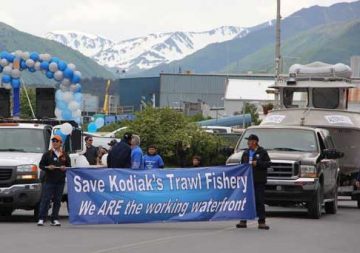 Gulf of Alaska groundfish will remain an open access fishery indefinitely after the North Pacific Fishery Management Council tabled a policy package that has enraged fishermen of all stripes over the last year. Depending on who is asked, the council acted at either its best or its worst with the decision. “The council process didn’t work. They didn’t solve the problem,” said Julie Bonney, executive director of the Groundfish Forum, an industry group of trawlers and processors. “They just took the political part first and ignored the management. I have to keep reminding myself, this isn’t about management. It’s about politics.” Others said the council did exactly what it should have done in the face of so many contentious decisions on which so many people expressed opinions. “I think this is actually the best illustration of council process, rather than the worst,” said Duncan Fields, a Kodiak attorney and former council member who was among the most vocal on this subject. “It shows that one gear group with a particular ideology and particular economic interest with very good advocates can’t just jam something through the council,” he said. “The council allows other participants, small boat fishermen, community, stakeholders to also have a voice, and that voice has said a catch share program is not the best public policy. You don’t always get the result you want.” Read the rest here 20:39
Gulf of Alaska groundfish will remain an open access fishery indefinitely after the North Pacific Fishery Management Council tabled a policy package that has enraged fishermen of all stripes over the last year. Depending on who is asked, the council acted at either its best or its worst with the decision. “The council process didn’t work. They didn’t solve the problem,” said Julie Bonney, executive director of the Groundfish Forum, an industry group of trawlers and processors. “They just took the political part first and ignored the management. I have to keep reminding myself, this isn’t about management. It’s about politics.” Others said the council did exactly what it should have done in the face of so many contentious decisions on which so many people expressed opinions. “I think this is actually the best illustration of council process, rather than the worst,” said Duncan Fields, a Kodiak attorney and former council member who was among the most vocal on this subject. “It shows that one gear group with a particular ideology and particular economic interest with very good advocates can’t just jam something through the council,” he said. “The council allows other participants, small boat fishermen, community, stakeholders to also have a voice, and that voice has said a catch share program is not the best public policy. You don’t always get the result you want.” Read the rest here 20:39
Walker administration says loophole costs $1.4M in taxes from some of the big Washington-based factory trawlers
 Gov. Bill Walker’s proposed fish tax increase has drawn attention to a loophole giving a discount of as much as $1.4 million a year to some of the big Washington-based factory trawlers that fish off Alaska’s coast — and Walker’s administration is working to fix it. Price estimates used by the state to assess existing taxes on 300 million pounds of yellowfin sole are less than one-sixth of the true prices upon which the taxes are supposed to be based, according to officials at the state Fish and Game department. Four other types of fish have also been discounted, some drastically, the department says, while one has been overvalued. Read the rest here 00:11
Gov. Bill Walker’s proposed fish tax increase has drawn attention to a loophole giving a discount of as much as $1.4 million a year to some of the big Washington-based factory trawlers that fish off Alaska’s coast — and Walker’s administration is working to fix it. Price estimates used by the state to assess existing taxes on 300 million pounds of yellowfin sole are less than one-sixth of the true prices upon which the taxes are supposed to be based, according to officials at the state Fish and Game department. Four other types of fish have also been discounted, some drastically, the department says, while one has been overvalued. Read the rest here 00:11
Adak seeks cod quota, factory trawlers cry foul
 Despite factory trawler opposition, Adak wants federal regulators to guarantee a minimum amount of Pacific cod each year, in hopes that the local fish processing plant will re-open. The Aleutian Islands Pacific cod catcher vessel fishery and shoreplant delivery requirement is on the agenda of the North Pacific Fishery Management Council meeting this week in Anchorage. The bottomtrawl factory trawler’s lobbying group, , condemned Adak’s request. Read the rest here 10:32
Despite factory trawler opposition, Adak wants federal regulators to guarantee a minimum amount of Pacific cod each year, in hopes that the local fish processing plant will re-open. The Aleutian Islands Pacific cod catcher vessel fishery and shoreplant delivery requirement is on the agenda of the North Pacific Fishery Management Council meeting this week in Anchorage. The bottomtrawl factory trawler’s lobbying group, , condemned Adak’s request. Read the rest here 10:32

































